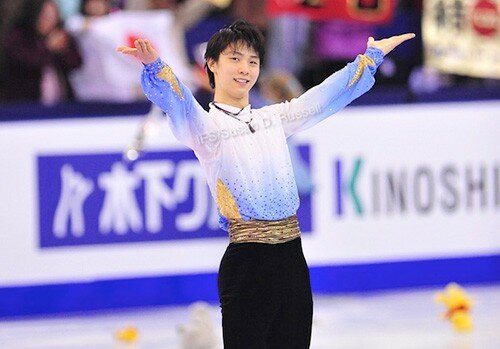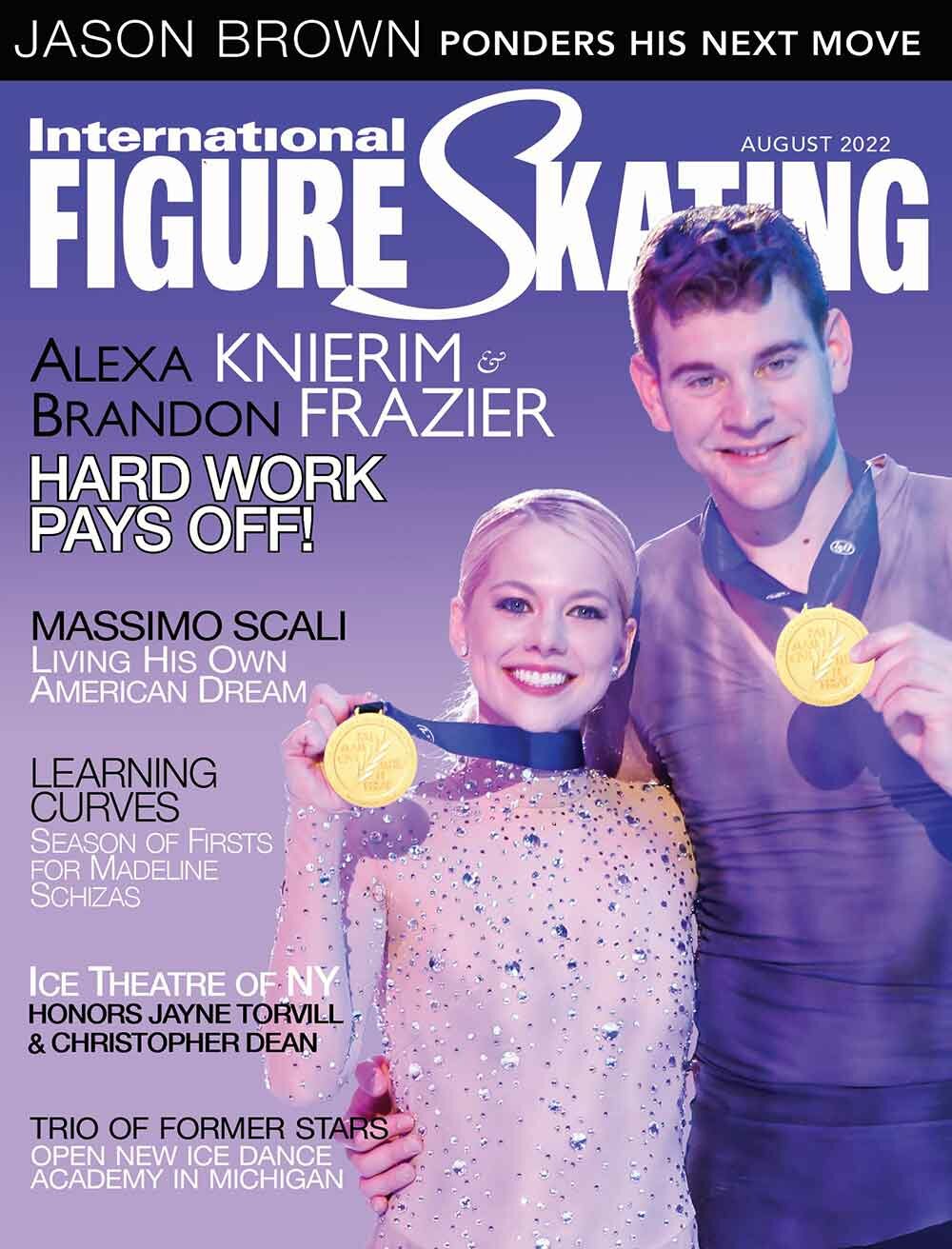

Once a competition many opted not to contest, capturing one of the coveted berths and competing at the prestigious Grand Prix Final is now the only goal for all skaters who participate in the Series. Some of the world’s best figure skaters hit the 2015-2016 Grand Prix circuit in October with high expectations. Some were realized, and some were dashed.
TRIPLE CROWN
Without doubt, the Final show in Barcelona belonged to Yuzuru Hanyu. He was on top of his game, executing solid quads, a triple Axel, and racked up his point total with high scores for his three spins. The reigning Olympic Champion scored 110.95, a new World record. With a lead of almost 20 points, Hanyu hit the ice for the free, reeling off a quad Salchow, a quad toe loop, a quad-triple toe loop and six further triple jumps, including two Axels. He once again broke his own record score, earning 219.48 for the segment and 330.43 points overall.
“I was feeling the pressure today. I am exhausted now but I did an almost perfect performance so I am satisfied,” said Hanyu, who is the first person to ever win three consecutive Grand Prix Final crowns.
From the outset, earning a berth in Barcelona was a top priority for Javier Fernández. Following his win in China, he was optimistic about his chances. Two weeks later, he pulled out a second win in Russia, and qualified for the Final ranked first overall. Fernández was the only man to win both of his assignments this season. Last to skate in the short, Fernández did not get off to a great start, with a stumble out of the quad Salchow. However, he rallied, landed his combination and the triple Axel and placed second with 91.52 points. “I scored better than last year, but I still had mistakes,” Fernández said.
As in the short, Fernández stumbled on the opening quad in his long program but went on to land a quad-triple combination, a quad Salchow and six triple jumping passes. His score of 201.43 for the segment made him only the second skater to ever surpass the 200-point mark. “It was always supposed to be a high-scoring program, but I could not nail it before, so I am pleased to do it here. It is the first time I broke 200 points, and that is really a big deal,” Fernández said. With 292.95 points in total, the Spanish star captured his second consecutive silver medal in Barcelona, and, even though he wanted to win, he was satisfied with his performances and his placement.
“After the short program, Yuzuru was really far away already in points and coming into the free. I was like, ‘I’m just going to skate my best and see what happens,’” Fernández said. “I think I skated great. I did everything that was planned. It has been a long time since I performed a clean free program.”
Shoma Uno, the 2014 Junior Grand Prix Final and 2015 World Junior champion, was the youngest competitor in the men’s event in Barcelona. He earned a berth to the Final following a second-place finish at Skate America and a first-place ranking at Trophée Éric Bompard. A fall on the quad toe in the short left him in fourth after the short. But Uno came back in the free, executing two quad jumps and seven triples and moved up to third with 276.79 points. “I’m satisfied with what I’ve done, but this is not a goal; it’s just a starting point. I was surprised to get over 190 points, but I think I can do better, and I would like to prove that,” the 18-year-old said.
Patrick Chan faltered in the short at his first event, Skate Canada, but came back to win the title over Hanyu. However, Chan did not fare as well at his second assignment, Trophée Éric Bompard, where he ranked fifth. In Barcelona, his short program performance was uncharacteristic. Two of his elements received no points and he landed in sixth. The long program went much better, and Chan wound up in fourth overall with 263.45, but that left him almost 67 points behind the leader.
In his senior debut at Cup of China, Boyang Jin, the 2015 World Junior silver medalist, became the first skater ever to attempt six quads in the short and the long programs. Though the Harbin native cleanly landed only two of the six, one of those earned him a place in the history books. His quad Lutz-triple toe loop combination in the short program garnered 19.19 points, the highest score ever awarded for an element. He punched his ticket to the Final with a second place finish at NHK Trophy.
Jin landed in third in the short in Barcelona, and, after the free, was tied with Chan overall. But, the free skate score is the tiebreaker, and Jin placed fifth. Daisuke Murakami was sixth with 235.49 points.
RUSSIAN CHARGE
One of the biggest surprises of the 2015 campaign came from last year’s junior stars, who hit the senior stages with a bang, claiming podium finishes and berths at the Final, leaving many of their seasoned senior counterparts in their wake.
Leading the charge was Evgenia Medvedeva, the 2014 Junior Grand Prix Final and 2015 World Junior champion, who kicked off her season with a win in her senior debut at Skate America. A month later she lost to Elena Radionova, who led a Russian sweep in Moscow. It was the first time the Russian ladies had swept a Rostelecom Cup podium since 1999. Medvedeva, who ranked second heading into the Final, won the short in Barcelona with a personal best score and a five-point lead.
Unlike others, who wilted under the pressure, Medvedeva showed no fear in the long, nailing two triple-triple combinations and four more triple jumping passes, earning another personal best score for the segment. It was a runaway victory for the 16-year-old, who racked up a combined total of 222.54, the second-highest score ever awarded in the ladies event. Medvedeva is the first lady to capture back-to-back junior and senior Grand Prix Final titles since Yuna Kim achieved the feat in 2005 and 2006.
“I didn’t expect to win this competition. Getting to the Final in my first season in seniors was unexpected and very nice,” she said. “I am so happy that I was able to skate two clean programs. This was a success for me. This year I feel that I have made a big step up.”
Japan’s Satoko Miyahara, third at Skate America and first at NHK Trophy, headed to her first senior Grand Prix Final ranked third overall. Though she executed an almost clean short, her program component scores had her in fourth by a slim margin of 0.37 behind third-place finisher Mao Asada.
Miyahara stepped it up in the free, executing a flawless performance that included seven triple jumps. She earned a new personal best score and moved up to second with 208.85 points. “I could have done better in the short, but I did better today,” the 17-year-old Kyoto native said. “I was nervous at first, but when I got the first jump, I thought, ‘OK, I can do this.’”
Radionova ranked fifth heading into the Final following a third place finish in China and the win in Russia. A hesitation on the entrance to the triple Lutz killed any hope of the combination she had planned. Thinking on her feet, she saved the day by adding a triple toe on the back end of a triple loop in the second half of the program. She ranked second in the short.
Technical errors and a fall marred her free skate, which was ranked fourth best of the day, and Radionova dropped to third overall with 201.13. “I have grown a lot this year, 7 centimeters or something like that. My body is changing, and that is something I need to get used to,” the 2014 World Junior champion said. “I’m ashamed I couldn’t keep it together. Maybe I was a bit nervous, I don’t really know.”
Ashley Wagner had a disastrous short program that left her in last place, 14.54 points behind the leader. But the 24-year-old roared back in the free with a crowd-pleasing performance that ranked third best. She landed in fourth overall with 199.81 points. “I have that unfortunate quality of skating my programs like two different people,” said Wagner, who missed the podium by 1.32 points.
Gracie Gold could not find her feet in either the short or the long program in Barcelona and placed fifth with 194.79. Asada, third after the short, fell to sixth with 194.32.
TWIRLING DUOS
Following the terrorist attacks in Paris, which forced the cancellation of Trophée Éric Bompard, the International Skating Union determined a fair and equitable resolution for those skaters who placed in the top three in Bordeaux. If any skaters who competed in France were the first alternates at the end of the Series, they would also earn a berth to the Final.
In the end, the pairs event was the only affected discipline, and Canada’s Julianne Séguin and Charlie Bilodeau were added to the Final roster.
Ksenia Stolbova and Fedor Klimov ranked fourth heading into the Final, but the Russian duo was flying high from the outset, winning the short program with 74.84 points. They continued their march to the top step of the podium with a solid free skate, posting a new personal best and mining gold with 229.44 points. “We are happy that we finally managed to skate clean and do all the elements for the first time in competition,” Klimov said.
“Pairs skating is moving forward, and more couples are doing quads. In this competition, it was enough to do a clean program with good jumps. But, in future I think we will need to do more high-level elements, like a quad throw.”
Reigning World champions Meagan Duhamel and Eric Radford placed third in the short but rallied in the free to move up to second with 216.67 points overall. “Clearly, the short wasn’t our best, but I think it was the strongest skate we’ve done this season.We felt more comfortable with the long program, and we are proud to have won this medal,” Duhamel said.
Yuko Kavaguti and Alexander Smirnov ranked second in the short, but two falls in the free dropped them to third with 206.59 points. “I made two major mistakes at the beginning of the program on jumps, so I’m really disappointed,” Kavaguti said.
Séguin and Bilodeau, the 2014 Junior Grand Prix Final pairs champions and 2015 World Junior silver medalists, were fourth with 200.98 points. Xiaoyu Yu and Yang Jin placed fifth with 186.87 points. Cheng Peng and Hao Zhang were sixth with 183.04 points, and Alexa Scimeca and Chris Knierim ranked seventh with 177.42 points.
STEPPING OUT
Barcelona once again proved to be a lucky place for Kaitlyn Weaver and Andrew Poje. The Canadian ice dancers claimed their second consecutive Grand Prix Final title, but the final result was a lot closer than it was in 2014. Weaver and Poje claimed the top spot in the short dance by a little more than a point over Madison Chock and Evan Bates with a solid performance to “The Blue Danube” and “Annen-Polka.”
The Canadian team earned a new personal best for their free dance set to “On the Nature of Daylight” and “Run” and claimed the title with 182.66 points. “We were really in the zone. We skated with our hearts, and, when you skate with your heart on the line like that, you can go home happy,” Weaver said.
For the first time in history, three U.S. teams qualified for the Final. Chock and Bates led the charge, laying down a solid performance in their short dance to “More” and “Unchained Melody.” A slight hesitation by Chock on a twizzle was the only error in their revamped free dance, set to Rachmaninoff ’s “Concerto No. 2.” The duo earned a season’s best score, placed third in the free but held onto second with 177.55 points.
“I think we’ve had a really, really challenging time getting this program ready for this event. We re-choreographed about half of it in the last three weeks, and, with a program that feels so new, it is challenging. We made some mistakes, and there are improvements to be made. It’s going to be a lot of work,” Bates said.
Italy’s Anna Cappellini and Luca Lanotte ranked third in the short and second in the free dance and captured the bronze medal with 176.37 points in total. “It is rather special for us to be at this Final as it is our first time winning a medal, so this is one competition we won’t forget easily,” Cappellini said.
Maia Shibutani and Alex Shibutani were fourth with 174.92 points. Ekaterina Bobrova and Dmitri Soloviev placed fifth with 166.73 points, and Madison Hubbell and Zachary Donohue danced into sixth with 163.20 points.
RELATED CONTENT:
2015 JAPANESE NATIONALS




